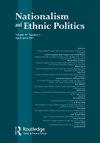印度未宣布的紧急状态:宪政和抵抗政治
IF 0.7
Q3 ETHNIC STUDIES
引用次数: 2
摘要
巴勒斯坦人早先受到奥斯曼帝国管理者的待遇。同时,德系犹太人、西班牙系犹太人、世俗犹太人、宗教犹太人、犹太复国主义者和反犹太复国主义者开始使用希伯来语进行交流;这导致巴勒斯坦犹太人接受了一种新的犹太复国主义文化,这种文化与奥斯曼主义相结合。正如菲什曼所报道的那样,犹太人和阿拉伯人之间的敌对关系随着“殉道者”这个概念的使用越来越突出而变得相当显著。奥斯曼帝国晚期看起来像英国托管时期,在某种程度上,让人想起“以色列与巴勒斯坦少数民族的托管后关系”(第150页),这种关系塑造了后来的关系。最后一章讨论了青年土耳其时期的犹太复国主义,其中微妙地强调了为奥斯曼犹太人构建犹太复国主义的许多复杂性。举例来说,奥斯曼代表尼西姆·马兹利亚(Nissim Mazliah)对犹太复国主义的偏好与他对奥斯曼国家的忠诚和对希伯来文化的倡导交织在一起。另一方面,对奥斯曼犹太人来说,比如首席拉比哈伊姆·纳胡姆和阿尔伯特·安特比,他们的反犹太复国主义完全是另一回事。“他们的反犹太复国主义绝不意味着他们反对犹太人移民到巴勒斯坦;相反,他们反对在巴勒斯坦建立一个独立国家的企图(与今天对反犹太复国主义的定义大不相同)。这本书是一个创新的研究,展示了奥斯曼帝国晚期如何为以色列-巴勒斯坦冲突做好准备,然后在英国托管期间发展了两个民族运动,并在1947-1948年战争之后得到巩固。菲什曼记录了平等的思想是如何从青年土耳其革命中产生的,如何导致犹太人和巴勒斯坦人制定民族国家主张,并将他们派往伊斯坦布尔。宣称“国土”对犹太复国主义的学者来说应该是有用的,他们想要更多地了解犹太复国主义在过去采取的不同形式;它记录了巴勒斯坦和巴勒斯坦的犹太社区是如何在奥斯曼帝国晚期的背景下出现的。本文章由计算机程序翻译,如有差异,请以英文原文为准。
India’s Undeclared Emergency: Constitutionalism and the Politics of Resistance
Palestinians earlier treatment by the Ottoman administrators. Also at this time, Ashkenazi, Sephardic, secular, religious, Zionist, and anti-Zionist Jews begin to use Hebrew language for communication; this resulted in adoption of a new kind of cultural Zionism among Jews in Palestine, which was meshed with Ottomanism. As Fishman reports the antagonism in the relationship between Jews and Arabs becomes quite remarkable with the use of the notion of “martyrs” gaining prominence. The late Ottoman period looks like the period of the British Mandate, and to a certain extent, evokes “Israel’s post-Mandate relations with its Palestinian minority” (p. 150) that shape later relationships. The last chapter discusses Zionism during the Young Turk period with many complexities in framing Zionism for Ottoman Jews delicately underscored. To illustrate, for the Ottoman deputy Nissim Mazliah, his Zionist preference was interwoven with his loyalty to the Ottoman state and his advocacy for Hebrew culture. For Ottoman Jews, like Chief Rabbi Haim Nahum and Albert Antebi, on the other hand, their anti-Zionism marked something else entirely. “Their anti-Zionism in no way meant they were against Jewish migration to Palestine; rather they were against an attempt at creating an independent state in Palestine (much different from how anti-Zionism is defined today)” (p. 207). This book is an innovative study which demonstrates how the late Ottoman period prepared the ground for the Israeli-Palestinian conflict before the two national movements developed during the British Mandate and consolidated later in the aftermath of the 1947–1948 war. Fishman documents how the ideas of equality came out of the Young Turk Revolution, led Jews and Palestinians formulate ethno-national claims and dispatch them to Istanbul. Claiming the Homeland should be of use to scholars of Zionism, who want to learn more about different forms it has taken in the past; it documents how Jewish community in Palestine and Palestinians emerged against the backdrop of late Ottoman state.
求助全文
通过发布文献求助,成功后即可免费获取论文全文。
去求助
来源期刊

Nationalism and Ethnic Politics
ETHNIC STUDIES-
CiteScore
1.30
自引率
0.00%
发文量
30
期刊介绍:
Nationalism & Ethnic Politics explores the varied political aspects of nationalism and ethnicity in order to develop more constructive inter-group relations. The journal publishes case studies and comparative and theoretical analyses. It deals with pluralism, ethno-nationalism, irredentism, separatism, and related phenomena, and examines processes and theories of ethnic identity formation, mobilization, conflict and accommodation in the context of political development and "nation-building". The journal compares and contrasts state and community claims, and deal with such factors as citizenship, race, religion, economic development, immigration, language, and the international environment.
 求助内容:
求助内容: 应助结果提醒方式:
应助结果提醒方式:


